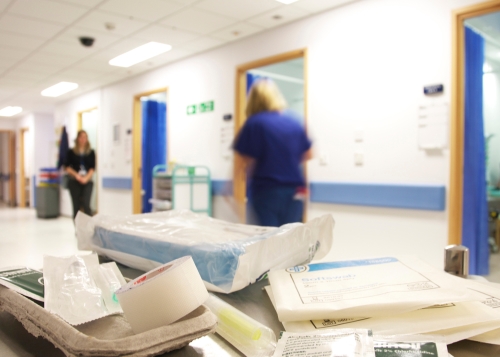An emergency department staff member is attacked roughly once every hour in England, as physical violence against nurses skyrockets, according to new figures from the Royal College of Nursing (RCN).
The union today published the results of a freedom of information (FOI) request to dozens of NHS trusts in England, and an accompanying survey of staff, on physical violence in accident and emergency (A&E).
“Behind these shocking figures lies an ugly truth: dedicated and hard-working nursing staff face rising violent attacks because of systemic failures”
Nicola Ranger
The RCN asked the trusts, 89 of whom responded, for the number of incidents of physical violence towards staff by patients each year between 2019 and 2024, in their largest A&E department.
According to analysis by the college, incidents had more than doubled in that time period, with 2,093 in 2019 compared to 4,134 in 2024.
Sadly, the college findings reinforce the shocking results of an investigation into violence experienced by nurses and midwives across the UK, which was carried out by Nursing Times earlier this year.
Nurses told the RCN that they feared for their welfare at work, with some reporting having developed mental health disorders as a result of violence on the job.
Sarah Tappy, a senior sister at an East London A&E, told the RCN that at one point she was punched so hard in the face by a patient that the blow knocked her out.
She developed anxiety and post-traumatic stress disorder (PTSD) from the incident, adding: “The violence is awful. And it’s just constant. Nurses, doctors, receptionists – none of us feel safe.”
In part, the RCN blamed the rise in violence on deteriorating conditions in A&E, in particular a rise in long waits.
Rachelle McCarthy, a senior charge nurse from the East Midlands, reported having been punched by a large drunk man in the face whilst on shift.
“Even patients you would expect to be placid are becoming irate because of just how long they have to wait,” she said. “You can only imagine the behaviour of those who are already prone to violence.”
The RCN described the rise in violence as “abhorrent” and urged the government to take action, or risk jeopardising its ongoing plans to reform the health service.
The union published figures of some individual trusts where the increase in violence had been particularly marked.
Manchester Royal Infirmary, part of Manchester University NHS Foundation Trust, reported a roughly 100% rise in annual incidents, from 39 to 79 between 2019 and 2024.
Meanwhile, physical attacks on A&E staff at Southmead Hospital, part of North Bristol NHS Trust, almost tripled, from 83 to 232.
RCN chief executive and general secretary Professor Nicola Ranger said the government “needs to do more” than just record data in order to address the violence.
This was in response to a recent government promise by health and social care secretary Wes Streeting to implement hospital-level reporting of violence against staff.
Professor Ranger warned that underlying problems like corridor care, understaffing and long waits must be addressed as a priority, in order to tackle the issue of rising violence.
“Behind these shocking figures lies an ugly truth: dedicated and hard-working nursing staff face rising violent attacks because of systemic failures that are no fault of their own,” she said.
“Every incident is unacceptable, but we need ministers and trust leaders to acknowledge some of the key underlying causes,” said Professor Ranger.
“Nursing staff not only go to work underpaid and undervalued but now face a rising tide of violence. It leads to both physical and mental scarring, lengthy time off and sometimes staff never returning.
“It is unarguably true that you can’t fix the health service when vital staff are too scared to even go into work,” she added.
Daniel Elkeles, chief executive of NHS Providers, which represents trusts, described the RCN findings as “absolutely shocking”.
He added: “NHS staff need a safe and respectful environment to look after patients, free from any threat of violence or intimidation, be they in hospital, mental health, community or ambulance settings.
“Delays for treatment are frustrating for patients and staff – every effort is being made to keep these to a minimum,” he said. “Trusts are committed to supporting their staff and keeping them safe.”
Virtually all nursing and midwifery workers in the UK have experienced physical violence at work, an exclusive Nursing Times survey revealed in March.
Staff reported being grabbed, punched, bitten, spat at, strangled, headbutted and even stabbed. Some face attacks on a daily basis.
The issue is so prevalent that many have been made to think that enduring physical violence is just “part and parcel” of being a nurse or midwife. Some reported having PTSD and permanent injuries.
Nursing Times, in partnership with the union Unison, surveyed more than 1,000 nursing and midwifery staff and students during February.
A staggering 93% of respondents said they had experienced physical violence at some point in their nursing or midwifery careers. A further 87% said that they had witnessed a colleague being attacked.

